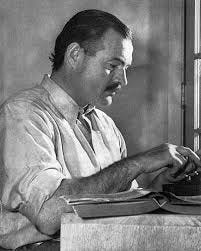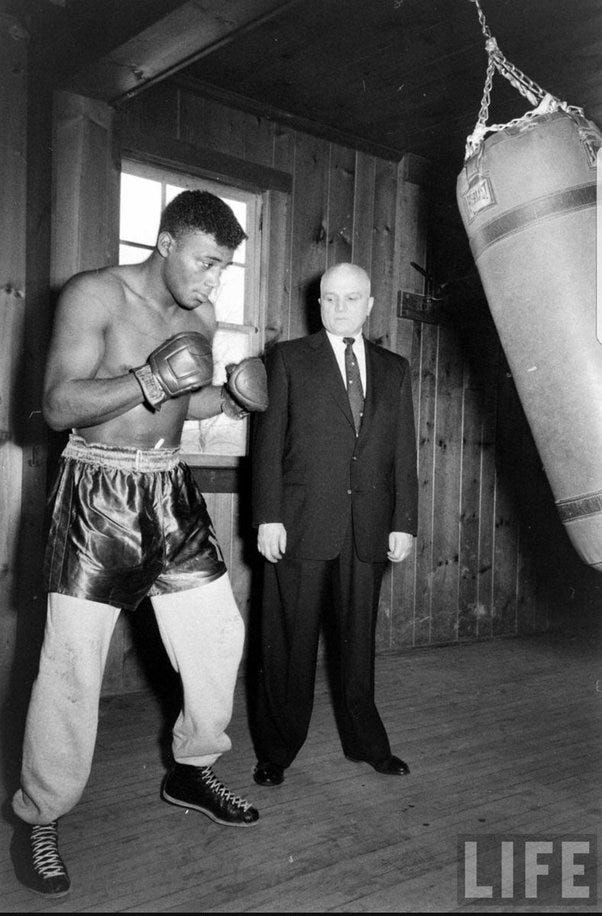"Fifty Grand" - Hemingway's epic morality tale
If you win your bet - against yourself - did you really win?
When it comes to ranking the classic short stories of Ernest Hemingway, the usual leading candidates are “Indian Camp” or “Big Two-Hearted River” or “A Clean Well-Lighted Place” or “Hills Like White Elephants” or even the magnificent “The Snows Of Kilimanjaro.”
When teachers select the best of Hemingway - those who still teach Hemingway - they usually start with those. Among all the American writers I taught, I’d have to say that I probably spent more time with his work. Because he seemed, still, to connect.
I had a chance to teach all of those stories over the years, both in higher level AP course and general 11th or 12th grade classes. I can say from experience that there remains something about Hemingway’s crystal-clear language that still resonates with young people. Happily, not only did it engage them, in some ways, it seemed to open doors to reading and comprehension that didn’t always seem to be there for other writers. By noticing his careful language, the intricate, meaningful gestures and masterful descriptions, and sometimes what he doesn’t say, there’s a classicism that to me, still lingers in his finest work, even after all these years.
After we’d done a few of Hemingway’s stories, we’d take a dive into “Fifty Grand,” a longer Hemingway story that originally ran in The Atlantic in July of 1927. In many ways, this is a quite different tale. His writing style is stretched out here, lots of dialogue - as always - but as Hemingway’s intent here is to reveal the complex character of Jack Brennan, the defending champion at the end of the line, he makes a fateful decision before his final title defense. There’s scene after scene to show us this guy in action. Or sleeping. Or trying to sleep in the middle of his stressful final training camp. We never see - or think that - about fighters. There’s a struggle outside the ring, too.


Unlike just about every other boxing story you can think of, Hemingway spends way more time (14 of the 18 pages in “The Complete Stories of Ernest Hemingway”) describing the tense build up and the monotony of daily training all the way up to the fight, only four pages on the dramatic fight itself. In doing so, he lets us into the rugged, often unseen world of a championship-level fighter coming to the end of a long and difficult and heartless career. The tension, the physical and mental sacrifice, the ache of it all, it’s here.
Brennan is not a nice guy, by a long shot. He’s cheap, there’s absolutely no pretense about him and if he feels like saying something, he says it. Like early in the story where a drunken woman, possibly of ill-repute, makes a crack about his cheapness.
Jack replies: “And you like to give away a lot of things free, too, don’t you?”
The dialogue crackles throughout. So much so, when we did it in class, we performed it like a play. I’d find a narrator to read much of it, used colored markers to indicate who was speaking when and we read it that way. If you think a bunch of high school kids can’t hang on every word through an 18-page short story, I wish you had been there with us. The ending always left them just about breathless.
What Hemingway does wonderfully in the story is make it clear that Brennan is no hero, no idol of the masses like we might think someone who carries the title of champion should be. When Brennan makes a controversial decision to make a considerable wager - the title of the story - against himself in the title bout, well, that got everyone’s interest.
From the perspective of the teacher, I always liked to teach this story immediately after we had our class project on “Eight Men Out,” where we’d watch the film and read additional stories about the infamous fixed 1919 World Series baseball games between the Chicago White Sox or “Black Sox” and the Cincinnati Reds.
After spending a week or so discussing whether it was morally correct for disrespected, underpaid baseball players to earn a year’s salary dumping a few World Series’ games for the gamblers, it made for a wonderful transition to Hemingway’s story of Jack Brennan, a World Champion in name only, making the decision, after a career of always trying to win, deciding to bet against himself in his farewell to boxing.
The idea, of course, was to have the kids decide about their own moral choices, their own values. Where were they? Was money everything? What did it do for the “Black Sox” eight of whom received a lifetime ban for their involvement in the fix? How did that lust for cash impact their lives? And what will it do for Jack Brennan?
What was remarkable - maybe it was a sign of the times - but invariably, every year, we would have healthy, leather-lunged arguments, sometimes for half the class, about whether or not what Brennan did, wagering AGAINST himself, was the right thing to do.
“He WON his bet,” one student insisted. “You’re damn right it was the right thing to do.”
“But what did he have to do to win it?” I would counter. “Do you think that’s the way a champion should go out? Betting against himself? Is that how a champion should behave? Shouldn’t that title mean something? Is that the way to end a career?”
“He got the money,” another answered, slamming his hand on his desk for emphasis. “That’s all that matters, isn’t it?”
Of course, that was exactly the lead I had been waiting for. Every year. It was my turn to counterpunch.
“Is it?”
A quiet smile on my face, I’d sit back down at my desk.
“OK. Now start writing…”
Here’s the story.
(Just cut and paste in your browser and enjoy the work one of our greatest writers or just listen!)
https://wholereader.com/fifty-grand_ernest-hemingway/



